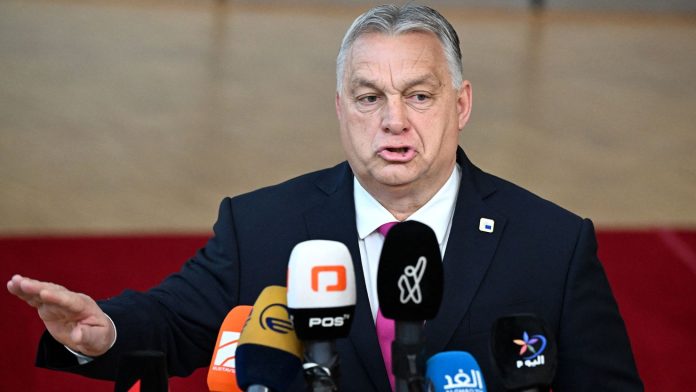EU leaders will meet Hungarian Prime Minister Viktor Orbán at a crucial summit in a bid to override his veto of a 50 billion euro financial bailout for Ukraine, RTE reports.
Last December, Orbán obstructed a deal to keep the funds flowing to Kyiv, drawing the ire of his 26 bloc colleagues.
EU officials are trying to find a compromise with Hungary to get agreement on a four-year package for Ukraine as part of a wider review of the bloc’s budget. Political analysts suggest the Hungarian leader is using the possibility of his influence over Ukraine’s finances as leverage to pressure the EU to release billions of euros of frozen EU funds to Budapest.
EU leaders have pledged to unite the 26-nation group to continue to bail out the Ukrainian government and allow it to continue paying salaries and providing services if they fail to persuade Orbán from his opposition, according to RTE.
However, given Kyiv’s possible budget deficit by spring and the uncertainty of continued support from the United States, this option would take longer to implement and would likely only cover aid for one year. Poland’s Prime Minister Donald Tusk said:
“One way or another, we will find some solution, with or without Orbán, to support Ukraine.”
European leaders will find it hard to sway their Hungarian counterpart to their side. Orbán struck a combative note upon arriving in Brussels last night, posting a picture of himself with the caption
“We Saddle Up!”
There are growing calls for other leaders to use EU Article 7 to strip Budapest of its voting rights. This would require the unanimity of all the other 26 leaders, and so far few are prepared to publicly push for such a “nuclear option”.
Meanwhile, the growing discontent of European farmers has also engulfed Belgium: several hundred farmers were also planning to send their tractors to Brussels to convey the discontent of the agricultural protest movement to the EU. The farmers are protesting in an attempt to save their own agricultural market from the flood of cheaper Ukrainian imports.
The main leverage for Brussels is some 20 billion euros in frozen EU funds, which it refuses to allocate to Budapest because of its poor record on issues such as corruption and LGBTQ rights, RTE reports.
In December, Mr. Orbán pushed through a decision to open EU accession talks with Kyiv a day after securing €10 billion from Brussels.
There are strong suspicions that he is now trying to make a similar move to secure additional funding, although Brussels insists the two issues are unrelated. A senior European diplomat said:
“It’s not about Ukraine, but basically Orbán is using this opportunity to blackmail the institutions of the EU and other member states.”
While the focus will be on Mr. Orbán and general funds for Kyiv, the leaders are also set to discuss the future of EU military support for Ukraine.
German Chancellor Olaf Scholz, whose country is Ukraine’s largest European donor, urged others to do more to help Kyiv. Scholz accused key EU countries such as France, Italy and Spain of not contributing enough to arming Ukraine.
The EU diplomatic service is pushing for an additional 5 billion euros for the military fund, but Germany argues that the contributions should be offset against bilateral aid.
